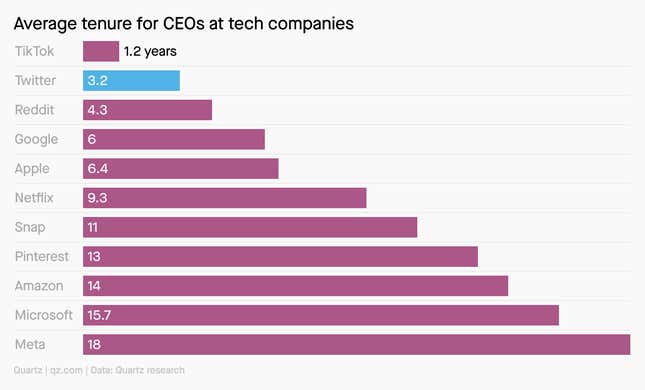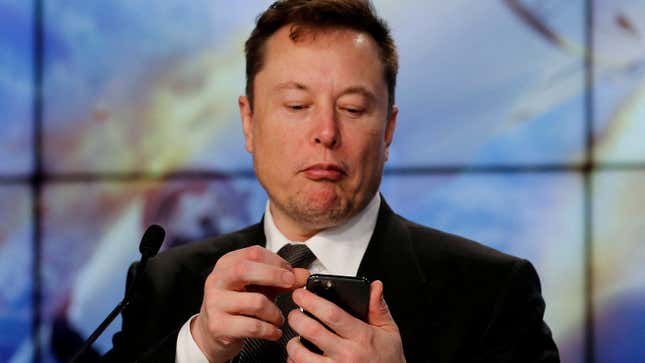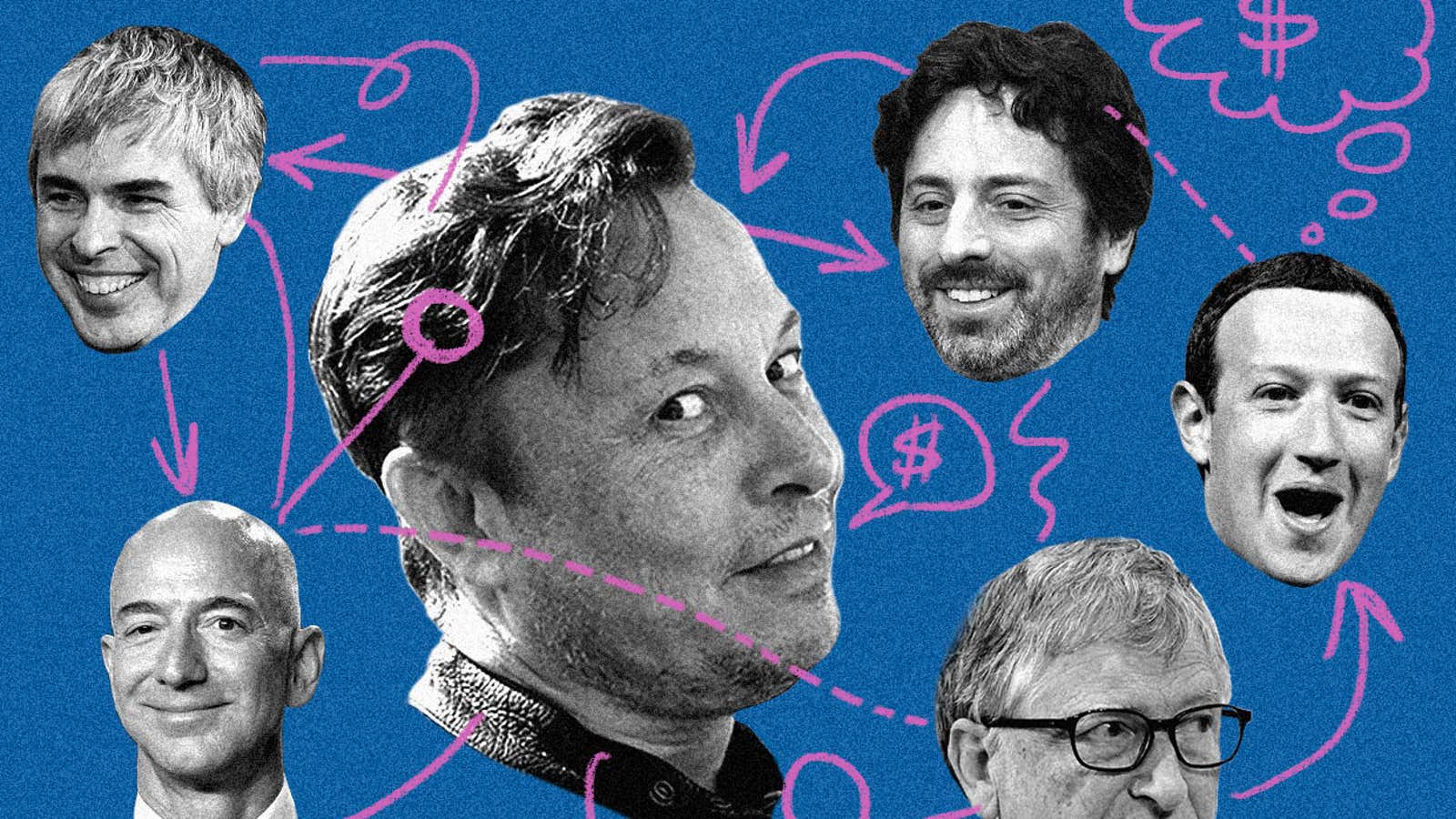
Hi Quartz members,
The announcement of Elon Musk’s purchase of Twitter prompted a wave of despair over the future of the already imperfect platform: people planning to leave Twitter, or worrying about the safety of their data, or wondering if Donald Trump will be allowed back. Musk has declared that his interest in the company lies in encouraging free speech, which could loosen even the few existing controls against hate speech and disinformation that Twitter imposes.
But to chalk all the anxiety up to Musk in particular, and to his loose-cannon persona, is to miss the bigger picture. Most of the US’ 10 top billionaires have either made their money through a confluence of tech and media, or purchased such platforms after making their money elsewhere. In fact, if the two holdouts in the top 10 went out and bought media giants tomorrow—if Warren Buffet snapped up Snap and Larry Ellison bought out the New York Times—we’d have a full house.
Michael Bloomberg and Mark Zuckerberg run Bloomberg and Meta, respectively; Sergey Brin and Larry Page co-founded Google and sit on the board of Alphabet; Amazon’s Jeff Bezos owns the Washington Post. Although they are no longer executives there, Bill Gates and Steve Ballmer earned their fortunes through Microsoft, which owns different kinds of social networking and media platforms like LinkedIn and Activision. Musk has merely joined this party—although to be sure, in taking Twitter private, he will be answerable to no one.
Recent regulatory moves, such as the EU’s string of laws and lawsuits, as well as the antitrust campaigns of Lina Khan, the chair of the US Federal Trade Commission, do feel like preliminary actions to size up and curb the influence of some of these companies. But the correlation between personal wealth and the tech-media business has been building for years—and so has recognition of regulators’ inability to keep pace.
The backstory
- Tech-slash-media is a rich man’s game. Six of the 10 richest Americans now own or control a business that straddles the line between media and technology, raising questions about their influence over speech and information.
- Regulating Big Tech is partly a political problem… Small-government ideologues don’t believe the government has any role in this sector, even to curb antitrust, privacy theft, and the worst effects of disinformation and hate speech.
- …but also partly an HR problem. All the best lawyers in this field “are being hired by the Googles and Facebooks,” says Ravi Bapna, a University of Minnesota professor who studies the tech sector. “Whereas federal institutions have been undermined and the top lawyers simply aren’t working there.”
New boss, who dis?
No matter who Elon Musk decides should helm a newly private Twitter, he’d do well to remember that its bosses don’t last long. The star-crossed social network may be one of the hardest tech companies to run, as evidenced by the high turnover among its chief executives.

What to watch for next
- Will the deal go through? As Yogi Berra said, it ain’t over till it’s over. While Twitter and Musk have agreed to the $44 billion acquisition, the deal still requires antitrust regulators to approve it, and either party could technically pull out (though there’s a financial penalty if either does; for Musk it’s $1 billion).
- Elon’s vision for Twitter the product. Musk has so far pledged to limit content moderation on Twitter, but it’s unlikely that fewer rules will help the underlying business. If Musk really wants to fix Twitter, he should move beyond its advertising business, improve its subscription offering, and make Twitter a better place for content creators.
- Elon’s vision for Twitter the company. Speaking at a conference last year, Musk said the only job titles that matter are president, secretary, and treasurer— “all of these other titles are just basically made up.” Time will tell how Musk marries Twitter’s culture with his unpredictable style and disdain for corporate norms.
- Elon’s vision for Parag Agrawal. Less than six months ago, Twitter’s former CTO replaced Jack Dorsey as CEO of the social network, having started at Twitter as an engineer. It’s been a bumpy ride for Agrawal, whose future now looks uncertain.
- Elon’s vision for social media. No matter what business model(s) Twitter pursues—advertising, subscriptions, NFTs—there are financial perils to letting hate speech and misinformation fester. But Facebook’s on-again off-again relationship with user growth is a good reminder: The biggest threat to a social media giant is whatever might unseat it.
One ⚖️ thing

Elon Musk is buying Twitter, but that doesn’t mean he can tweet whatever he wants. On April 27, a federal judge upheld the “Twitter sitter” requirement that Musk agreed to in his settlement with the US Securities and Exchange Commission (and later sued to remove). That means Musk still can’t legally tweet about Tesla’s business without a lawyer’s approval.
Quartz questions to spark conversation
🤔 Why do some people never get covid?
⏬ Is GDP selling the US economic recovery short?
📸 What does a “selfie drone” look like?
🌍 How is Ukraine changing US perceptions of China?
🌆 What exactly is a floating city?
🧠 Is it concentration problems… or is it long covid?
5 great stories from elsewhere
😡 Home sick. In 2019, KRR paid $1.3 billion for BrightSpring Health Services, which provides homes for people with intellectual or developmental disabilities. Then things went downhill. A BuzzFeed News investigation charges the private equity giant with letting abuse, neglect, and attrition send BrightSpring homes into crisis.
🕵️♀️ Criminal minds. Stéphane Bourgoin was one of France’s most prominent experts on serial killers, whose career was inspired by the murder of his girlfriend. Or was it? The New Yorker looks at a group of true-crime fans who dug into Bourgoin’s story. “As soon as we started looking,” one says, “we found more and more inconsistencies.”
💅 Last girlboss standing. Almost a decade after it was founded, beauty startup Glossier is trying to scale without losing its shine—and is still helmed by Teen Vogue intern turned entrepreneur Emily Weiss. Bustle profiles the remarkably resilient founder/CEO, who one former employee describes as having a “magical element.”
💀 What remains. In 2020, 56% of Americans who died were cremated, more than double the 27% of two decades earlier. By 2040, four out of five Americans are expected to choose cremation. The Washington Post looks at this fascinating evolution in how we deal with death, and the financial, demographic, and environmental factors driving it.
😴 How’s your REM cycle? In a quirky history and stinging critique, Real Life takes on sleep wearables: “As we become accustomed to the increasing convergence of sleep and action—and increasingly unaccustomed to experiencing sleep outside frameworks of production and activity—who knows what further reductions, adulterations, and debasements to our repose we might accept?”
Thanks for reading! And don’t hesitate to reach out with comments, questions, or topics you want to know more about.
Best wishes for an acquisitive weekend,
—Samanth Subramanian, senior reporter
—Scott Nover, emerging industries reporter
